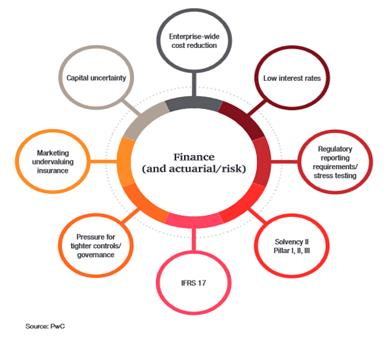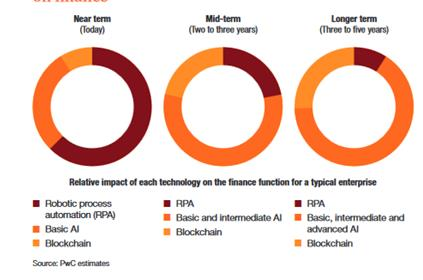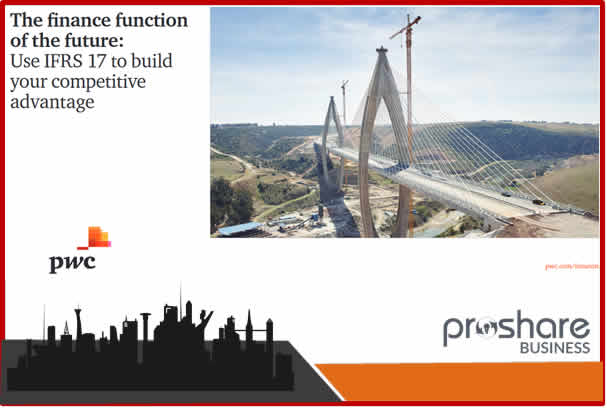Introduction
Imagine a future in which finance can monitor business performance inreal time and provide results to stakeholders where and when they need them.
Imagine it can close the books in two days and fully explain what drovethe results. And that it can identify profitable customer segments and guidesales to those customers, or scan the horizon, preparing contingency plans toaddress the impact of things like market volatility. In essence, imagine thebusiness benefits of having a finance function that provides timely, actionableinsight and is a key partner to strategic decision making.
Our view is that this future is possible today, and that modernisedinsurers with this capability will significantly outperform their peers. IFRS17 (the International Financial Reporting Standard issued in May 2017), iflooked at as more than a mere compliance requirement, provides the businesscase to start building this finance function of the future now.
Fig 1: Current external pressures on finance

Use IFRS 17 to build your competitive advantage
Imagine a future in which finance can monitor business performance inreal time and provide results to stakeholders where and when they need them.Imagine it can close the books in two days and fully explain what drove theresults. And that it can identify profitable customer segments and guide salesto those customers, or scan the horizon, preparing contingency plans to addressthe impact of things like market volatility. In essence, imagine the businessbenefits of having a finance function that provides timely, actionable insightand is a key partner to strategic decision making.
Our view is that this future is possible today, and that modernisedinsurers with this capability will significantly outperform their peers. IFRS17, if looked at as more than merely a compliance requirement, provides thebusiness case to start building this finance function of the future now.
The importance of improved analytics
IFRS 17 is not just a new accounting standard for insurers – the changesit requires will affect almost every stakeholder and functional area, and manysystems and processes, which is why it makes sense to use the standard as aspringboard for broader change. And when thinking about the functionality thefuture will demand, highly developed information analytics will become the keydeterminant of competitive differentiation.
Insurers need greater business insight from their finance functions, andare increasingly seeking timely, forward-looking analysis to aid in thedecision-making process.
In addition, many companies are asking how they can leverage both theirvolumes of historical structured data and emerging unstructured data to supportstrategic decisions. IFRS 17 is adding to these growing urgencies asstakeholder groups try to understand the implications of the new standard onthe profitability of their organisations and the sustainability of profits.
To deliver more analytical power, the speed and sophistication ofmanagement dashboards will have to improve. Business users should be able to‘self-serve’ their analysis and slice and dice data with very little help fromfinance, actuarial or IT, and results should be presented in a more visual way.It’s also important that users be able to perform ad hoc analysis in additionto periodic management reporting.
These objectives create a unique opportunity for finance to leverage newtechnologies, such as virtualisation (e.g., remote data conditioning), cloudhigh-performance computing capabilities (e.g., actuarial calculationengines in the cloud), new analytical tools (e.g., those that couple machinelearning with reporting capability) and blockchain architecture. Also,cloud-based computing, by reducing insurers’ own fixed costs, can create avariable cost structure for insurance.
All of this not onlyenhances the customer experience but also generates a considerable amount ofnew unstructured data that can provide insurers with valuable competitiveinsights. For example, having real-time operational data enables proactive riskmanagement and loss reduction, which ultimately helps reduce overall claims andexpenses. Predictive analysis is not new to insurance underwriting or customeracquisition, but using it across all areas of the organisation is, and so isincorporating unstructured data in real time.
With better data, put tobetter use, finance and actuarial functions will have an opportunity to cutacross organisational and data boundaries to look at opportunities and risks innew ways. Specifically, the finance function of the future can help determine:
- Where to grow and invest by providingreal-time data for market inputs, claim assumptions and scenario analysis tomore quickly understand potential disruptions and opportunities.
- How to measure business performance byunderstanding key drivers and providing insightful reporting at various levelsof the organisation.
- How to manage risks by helping to enhancedata governance and stress test plans and actuals in order to guide theorganisation within defined risk parameters.
Fig 2: Which technologies will have the biggest impact on finance

Creating a bionic finance function
If you believe that the finance function must change, the next questionis how to make it happen. How exactly can the finance function of the futuresatisfy various stakeholders, and also gather, analyse and explain metrics –both traditional inputs and new data – and participate in more complex planningand budgeting?
Deliveringon this vision of the future will require a strategic modernisation of finance,actuarial and risk into an integrated model with some of the followingcharacteristics:
- Integrated reporting/managementinformation (MI)capability for financial, risk and operations.
- Shared data or sources of data that limit the need to reconcile acrossfunctions.
- Cloud andcloud-based finance applications versus on-premise solutions.
- Highly automated processes and workflows to speed up close, improve governanceand minimise manual handoffs.
- The right skills allocated to the right processes ratherthan organised by qualification
- Rolerotation and career paths across the integrated function and within thebusiness.
- ‘Para’roles, such as‘para-actuaries’ with basic skills to do a high-quality job with low-value dataanalytics and actuarial work.
- Changecapability builtto maximise the effectiveness of change agents.
Key to making thismodernisation work is a new approach to connectivity, not just among siloedgroups but between man and machine, to create a bionic function. This isessential because people need machines to quickly understand new data andmetrics.
There is real potentialfor automated front-to-back transaction processing, which would drive costs forthese activities close to zero. Machines would be able to complete routinetasks that don’t require judgment, emotional intelligence or perception. Thiswould allow finance specialists to remain focused on relationships,interpreting the future requirements for the organisation and figuring out howto encode these requirements as evolving business rules for the machines to usein execution.
This marriage of man andmachine will enhance quality of life for employees, too.
Technology will continueto increase access to the workplace and to its data, allowing finance processesto take place at any time and location and by means of several interfaceplatforms. Digital convergence and digitisation have made a powerful range oftools available in the office, on the road, at home or on the train. The mobiledevice, the tablet, the cloud, virtual meetings, and software and hardwareoffer a real alternative to finance employees always being at their desks or intheir traditional places of work.
Download (4.98 mb) The financefunction of the future
Related Content
1. Use IFRS 17 to build your competitiveadvantage
2. Threesimple ideas can take the panic out of your prep for IFRS 17
Insurance companies have less than three years to adoptIFRS 17 but a soft design approach can help.
3. 21stCEO Survey: Key findings from the insurance industry
4. IASBclarifies certain IFRS 17 requirements through its annual improvement amendmentprocess
RelatedNews
1. IFRS16 to Fuel Use of JVs to Avoid Lease Capitalisation
2. HowGovernment And Its Agencies Can Be More Efficiently Run – The BOI Example
3. NewTransfer Pricing Regulations, Guidelines and Circular - Legal Alert
4. #NES24:Executive and Legislature must Work Together For Nigeria’s Progress-Saraki
5. SenatePasses Resolution Mandating CBN To Suspend Bank ATM Charges
6. ADR- Alternate Dispute Resolution Multi-Door Court House – Legal Alert
7. NASSBERBills – A Status Update On Market Related Legislation
8. Stakeholdersexplore the Role of IST in Nigerian Capital Market Dispute Resolution
9. RegulatoryConversations – A Public-Private Dialogue Holds On Sept 18, 2018
10. LeadershipLessons In Alibaba''s Jack Ma Succession Plan Letter - Full Text
11. NIPCengages Singapore Investors on Enterprise Development
12. Communiqueof the 58th Annual General Conference of the NBA
13. CopyrightCollective Societies'' Regulations Revisited - Legal Alert
14. IFRSReporting – Matters Arising On Derivatives
15. CorporateGovernance As A Strategy For Investment Drive – August 2018
16. NigerianPatient’s Bill of Rights: 5 Things to Note
17. IFRS15 Implementation Efforts of 2018 Interim Reporters in the Oil and Gas Industry
18. SharesPump and Dump Schemes - Legality
19. SalesTax versus VAT: Supremacy - Case Law Review
20. TheDraft Nigerian Code of Corporate Governance 2018 For Your Input
 Lagos, NG • GMT +1
Lagos, NG • GMT +1











 4737 views
4737 views








 Sponsored Ad
Sponsored Ad
 Advertise with Us
Advertise with Us









